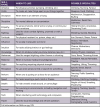Picaroon Jack
And the Brothers Slack
- Joined
- Jul 6, 2018
- Messages
- 4,308
- Reaction score
- 15,695
We've been discussing Part-time Gods (2E) in another thread and since I ran it last year, I thought it might be beneficial to do a walk through. I will say when I was looking for a game that could emulate American Gods by Neil Gaiman, the Pub suggested a few and PTG2E was one of the suggestions. However, it is coming from a different place metaphysically than American Gods, and although it didn't have the feel I was hoping for, PTG2E was still a really fun game. It was more like a supers game where everyone has the same origin, which is they hold the spark of old gods from ancient times.

Here is what it says on the tin:
I'll go through character creation and then hit things like the intruders, how to use powers in your Dominion, combat and things like that over the next few days. I would note that I have not played 1E and have no idea what the differences are between the two editions, but we talked about those in another thread last year, and I believe they are some what substantial.

Here is what it says on the tin:
Long ago, an entity known as the Source visited humanity and gifted certain people with divine power. For a time, the world existed in a state of balance between order and chaos, between life and death, between divinity and mortality. That is, until the gods waged war against the Source and eventually against each other, until the gods were close to extinct.
The gods of today are shadows of what the old gods possessed. Their power has been heavily diminished, and many choose to live a regular, mortal life, revealing themselves as gods only when absolutely necessary. The reason for this is twofold. First, fate doesn’t like it when the gods share their secrets with a mortal. Unless they are the god’s worshipper, terrible events and horrific accidents have a way of happening to the people closest to the god. Secondly, divine works attract creatures and monsters called Outsiders, created by the Source (after its capture) to destroy any god they encounter.
And so, the gods exist today in a state of flux. They have a mortal life, a job (or career if they’re lucky), friends, family, and everything that comes with being human, and they work hard to protect these things from harm. On the other side of the coin, they also have a Dominion to command and oversee, a deific Territory to defend from intruders, secret societies to which they owe allegiances (called Theologies), and other gods in their pantheon to try to get along with. This becomes their life, the balancing of the mortal and the divine, the normal and the supernatural, the mundane and the strange. The gods belong not to either world completely, and each of them knows that delving too deeply into one means losing pieces of the other.
I'll go through character creation and then hit things like the intruders, how to use powers in your Dominion, combat and things like that over the next few days. I would note that I have not played 1E and have no idea what the differences are between the two editions, but we talked about those in another thread last year, and I believe they are some what substantial.









 !
!